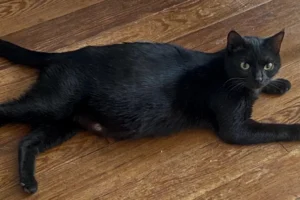After being spayed, many cat owners notice a significant increase in their feline friend’s affectionate behavior. So, why are cats more affectionate after being spayed?
Hormonal Changes
Spaying your cat can lead to significant hormonal changes that play a role in their increased affectionate behavior. When a female cat is spayed, the procedure removes the ovaries, which are responsible for producing hormones that regulate their reproductive cycle. Without these hormones, the cat’s behavior can shift, often resulting in a more affectionate and calmer demeanor.
One key hormone affected by spaying is estrogen, which is closely linked to a cat’s heat cycles. By eliminating these cycles through spaying, the cat no longer experiences the physical and emotional stress that comes with them. This can lead to a more relaxed and content cat, more inclined to seek out affection from their owners.
Additionally, spaying can also decrease the production of testosterone in male cats, which may reduce aggressive tendencies and make them more prone to seeking out human interaction. Overall, the hormonal changes brought about by spaying can contribute to a cat’s increased affection towards their owners.
Pain Relief
Following spaying, cats no longer have to endure the discomfort of heat cycles or the physical strain of potential pregnancies. This relief from pain and discomfort can result in a more content and at-ease feline companion, which in turn may lead to increased affectionate behavior towards their owners.
Without the distraction of heat cycles and the stress of potential pregnancies, spayed cats can focus more on bonding with their human family members. They may seek out more cuddle time, purr more often, or even exhibit more playful behavior. This newfound sense of comfort and security can foster a deeper connection between the cat and their owner.
Moreover, the absence of painful symptoms associated with heat cycles can also contribute to a cat’s overall well-being, making them more receptive to physical touch and seeking out affectionate interactions. By spaying your cat, you are not only preventing unwanted litters but also potentially enhancing the bond between you and your feline friend.
Reduced Stress
Spaying eliminates the hormonal fluctuations associated with the mating urge, which can lead to decreased stress and anxiety in cats. Without the constant drive to mate, cats can relax more, making them more likely to seek out and enjoy affection from their owners. This reduced stress can result in a calmer and more affectionate feline companion. Additionally, spaying can help prevent potential health issues related to reproduction, further contributing to a healthier and happier cat overall.
Bonding with Owner
During the recovery period after being spayed, cats may seek comfort and reassurance from their owners. This time of vulnerability can create a stronger bond between the cat and their human, as the cat learns to trust their owner for care and support. This increased bond can lead to a more affectionate relationship, with the cat showing more signs of affection and seeking out cuddles and attention from their owner. Taking advantage of this bonding period can help solidify a lasting and loving connection between you and your spayed cat.
Additional Unique Insight:
Quality Time:
Spending quality time with your cat post-spaying can further strengthen your bond and increase affection. Engage in activities that your cat enjoys, such as interactive play sessions or gentle grooming. This time together not only provides mental stimulation but also reinforces the emotional connection between you and your furry friend. By investing in these bonding activities, you can cultivate a deeper level of affection and trust with your spayed cat.
Health Benefits
Spaying your cat doesn’t just prevent unwanted litters; it also comes with significant health benefits that can contribute to increased affectionate behavior. By spaying your cat, you can help prevent uterine infections and breast cancer, which are common in unspayed females. Additionally, spaying can lead to a longer lifespan and improved overall quality of life for your furry friend. When your cat is healthier and feeling good, they are more likely to show affection towards you and other pets in the household. So, the next time your spayed cat curls up in your lap for a cuddle session, remember that their spay surgery has played a role in their increased affection.
Socialization Factors
After being spayed, a cat’s socialization environment can have a significant impact on their affectionate behavior. A calm and positive atmosphere at home can help your cat feel more relaxed and comfortable, leading to increased displays of affection. Spending quality time with your cat, providing toys for mental stimulation, and offering treats as rewards can all contribute to building a strong bond with your feline friend post-spaying. Additionally, introducing your cat to new experiences and socializing them with other pets can help them feel more secure and confident, ultimately leading to more affectionate behavior towards both humans and animals alike.
- Spaying reduces the risk of certain cancers in cats, such as mammary and ovarian cancer.
- Providing a safe and enriching environment post-spaying can encourage positive socialization and increased affection from your cat.
- Regular play sessions and mental stimulation can help strengthen the bond between you and your spayed cat.
- In some cases, spayed cats may exhibit less aggressive behavior, making them more inclined to show affection towards their owners.
Common Misconceptions
Spaying a cat does not make them less affectionate. In fact, most cats become even more loving and cuddly after being spayed. This misconception may stem from the fact that female cats in heat can sometimes exhibit more attention-seeking behavior. However, once a cat is spayed, they no longer experience the hormonal changes that drive them to seek out a mate, leading to a more consistent and calmer demeanor. So, rest assured that your spayed cat can still be a loving companion.
Training and Reinforcement
To further encourage affectionate behavior in your spayed cat, consider utilizing positive reinforcement techniques. Cats respond well to rewards like treats or praise when they display affectionate behavior such as snuggling or purring. Additionally, spending quality time with your cat through interactive play and grooming can strengthen your bond and encourage them to be more affectionate. Remember to be patient and consistent in your training efforts, as cats respond best to gentle and positive reinforcement.
Tips for Encouraging Affectionate Behavior in Spayed Cats:
– Use Treats: Reward your cat with treats when they display affectionate behavior.
– Playtime: Engage in interactive play sessions to bond with your cat and encourage affection.
– Grooming: Regular grooming sessions can help strengthen the bond between you and your cat.
– Patience: Be patient and consistent in your training efforts to see positive results.
– Quality Time: Spend quality time with your cat to build a strong and loving relationship.
Fun Facts
Did you know that spaying can actually reduce the risk of certain health issues in cats, such as mammary tumors and uterine infections? It’s not just about preventing unwanted litters – it’s also about keeping your feline friend healthy and happy.
A fun fact about spayed cats is that they tend to be more affectionate and social after the procedure. This could be due to hormonal changes that result from spaying, leading to a more relaxed and loving demeanor in your furry companion.
Spaying your cat can also help reduce aggressive behavior, marking, and roaming tendencies. So not only does it benefit your cat’s health, but it can also make your pet a more pleasant and loving member of your household.
Benefits of Spaying
- Reduces the risk of certain health issues like mammary tumors and uterine infections.
- Helps decrease aggressive behavior, marking, and roaming tendencies.
- Can lead to a more affectionate and social cat.
Remember, spaying your cat is not only about preventing unwanted litters – it also has numerous benefits for your cat’s health and behavior.
Alex, a passionate animal lover, has experience in training and understanding animal behavior. As a proud pet parent to two dogs and three cats, he founded AnimalReport.net to share insights from animal experts and expand his knowledge of the animal kingdom.




